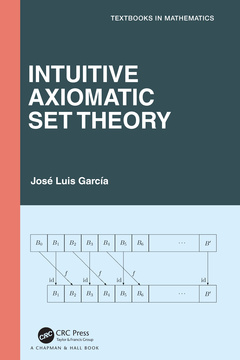Description
Intuitive Axiomatic Set Theory
Textbooks in Mathematics Series
Author: Garciá José L
Language: English
Subject for Intuitive Axiomatic Set Theory:
· 15.6x23.4 cm · Hardback
Description
/li>Contents
/li>Readership
/li>Biography
/li>
Set theory can be rigorously and profitably studied through an intuitive approach, thus independently of formal logic. Nearly every branch of Mathematics depends upon set theory, and thus, knowledge of set theory is of interest to every mathematician. This book is addressed to all mathematicians and tries to convince them that this intuitive approach to axiomatic set theory is not only possible but also valuable.
The book has two parts. The first one presents, from the sole intuition of "collection" and "object", the axiomatic ZFC-theory. Then, we present the basics of the theory: the axioms, well-orderings, ordinals and cardinals are the main subjects of this part. In all, one could say that we give some standard interpretation of set theory, but this standard interpretation results in a multiplicity of universes.
The second part of the book deals with the independence proofs of the continuum hypothesis (CH) and the axiom of choice (AC), and forcing is introduced as a necessary tool, and again the theory is developed intuitively, without the use of formal logic. The independence results belong to the metatheory, as they refer to things that cannot be proved, but the greater part of the arguments leading to the independence results, including forcing, are purely set-theoretic.
The book is self-contained and accessible to beginners in set theory. There are no prerequisites other than some knowledge of elementary mathematics. Full detailed proofs are given for all the results.
1. Introduction. 2. Objects, Collections, Sets. 3. Classes. 4. Relations. 5. Maps, Orderings, Equivalences. 6. Numbers and Infinity. 7. Pure Sets. 8. Ordinals. 9. ZF-Universes. 10. Cardinals and the Axiom of Choice. 11. Countable Universe. 12. The constructible universe. 13. Boolean Algebras. 14. Generic extensions of a universe. 15. Independence proofs.
José Luis García is Emeritus Professor at the University of Murcia, Spain. He began his study of Mathematics at the University of Granada (Spain). After several years teaching Mathematics in secondary school, he was enrolled by the University of Murcia (Spain) as a member of the group working on algebra, led by Professor Gomez Pardo. He received his doctorate and a permanent position at the same university. He developed his research on Ring and Module Theory. He became full professor in 1991, and then served for thirty years.




